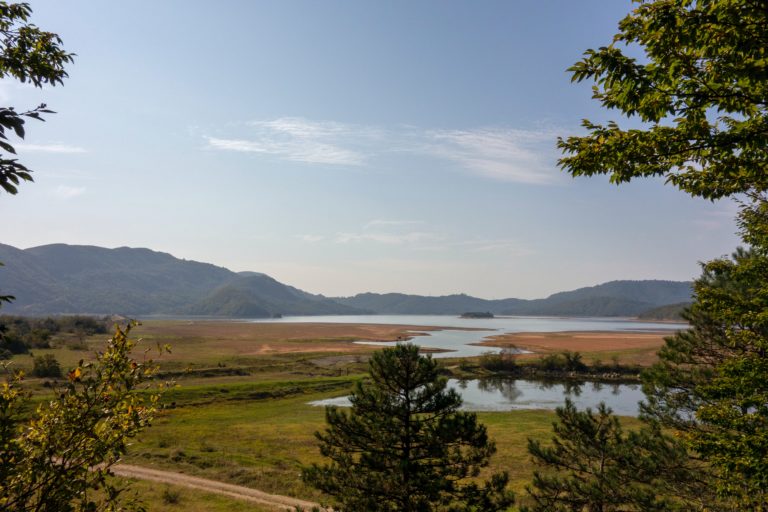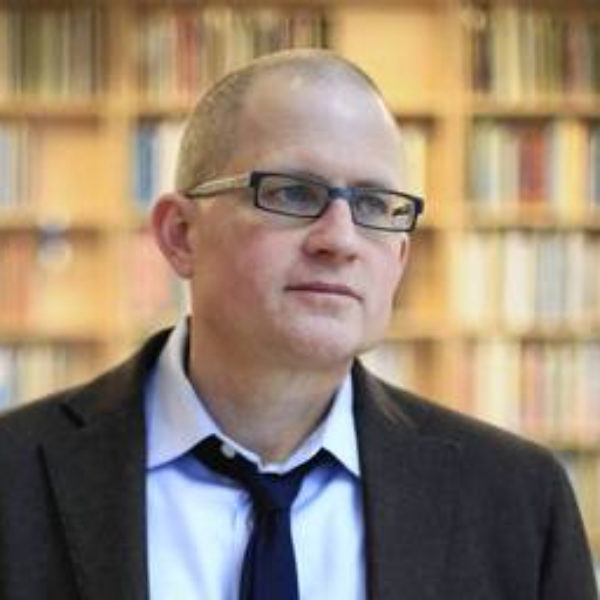The Reservoir
There is a lake from which no sun returns.
Brown, glintless, it lies in the land like the land.
A man might be forgiven for thinking he
might walk that water like any acre’s dirt,
might stride the man–made dam like a god in mind.
•
If it is grief that brings him here, it is
a grief in which the land participates,
a dry grief, a grief of heat, in which the trees’
contortions tighten and the cacti crouch.
He stares and stares at the unchanging lake.
•
Neither the shy possum nor rare mule deer,
nor horned toad with its tough embattled back,
nor tenuously existing crane, nor billion years
of armadillo clenched around one heart:
if creatures come they come to sip the dark.
•
Can this still be a source? Can a stranger
still claim to taste what the whole town denies,
that taint of earth in the purest glass, some ghost
of dust that brings almost a further thirst?
It is a taste to which one grows accustomed.
•
If a mountain moved, if the whirlwind knew
his name, if there arose around him a city
of jasper, still, this leaching heat would be
his dream, his chance at home, this shrunken lake
where all his jigsawed creekbeds pour their nothings.
•
Over the lake, out of the mind, a small whine
finds a form, a time, his father at the wheel.
He’ll rock the bow, he’ll tickle catastrophe,
but not now, not here, just this trim craft
skimming the water, lighter than water, and the small whine.
•
Kneeling in mud, shirted because he’s burned,
already badly burned, humming some nothing,
lost in the long atomic pause of childhood,
head bowed, cheeks bright, finger–streaked with black
as if the dark he worked on worked on him…
•
What god more dead than the god of childhood? What child
more gone than the wandering one, the heedless one,
whom parents drown to keep their children near?
He has no name, no home, no certain birth,
is never found because he never was.
•
He stares and stares at the unchanging lake,
which—past the shallows, where to his truant eyes
the best schools used to rise—changes: soft pocks,
small sparks, as of some clear aboriginal rain
so light, so lost, that light is all it is.
•
Deep in the beargrass and the broomweed, deep
in time, two teens whom time has torn apart
have spread a blanket, borne their bodies toward
the little oblivion they call, rightly, love,
and made of the air an unguent made of them.
•
She who in her last days loved too well to lose
a single weed to namelessness, in creosote,
blue grama, goatsbeard that is not thriving, is,
amid the cattails’ brittle whisper whispers
O Law’, Honey, ain’t this a praiseful thing.
•
A shadow on the water soft as thought
slows, wavers gently, as if some shadowy life
with which it might be one, be none, beckoned,
before the life to which it’s tethered tugs
and the high bird that knows to keep on going goes.
•
What fights so hard to stay unknown, unnamed?
Before the eyes fix inward and the scales are scraped off;
before the larval innards—the migrained reds,
abysmal blacks—glop back into the brown water,
there is this line pulled taut. This grip. This glee.
•
Say a child, a man, any creature quick with being
broke this sullen plane, it would seem the ground
grew fluent as he moved, a slow undulance
of earth in which he floated, vanished, rose, was—
if some distant someone were to see it.
•
There comes a time when time is not enough:
a hand takes hold or a hand lets go; cells swarm,
cease; high and cryless a white bird blazes beyond
itself, to be itself, burning unconsumed.
There comes a time when it is time to be
•
alive by a lake where the sun dies and dies.
Brown, glintless, it lies in the land and in the mind.
A man might be forgiven for loving dust,
dead weeds and a cracked, receding shore,
a sky so empty that it has no end.
“The Reservoir” is from the book Every Riven Thing by Christian Wiman. Copyright © 2010 by Christian Wiman. Used by permission of Farrar, Straus and Giroux, LLC.
Listen to Christian Wiman’s On Being interview, “How Does One Remember God?”


